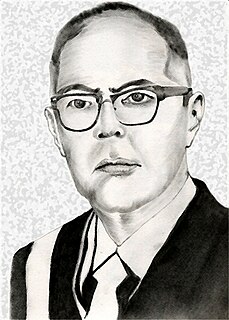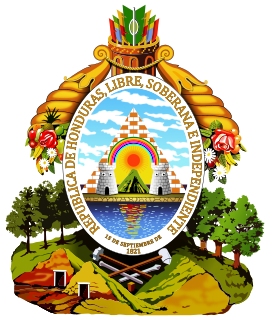
Legislative elections were held in El Salvador on 8 March 1970. The result was a victory for the National Conciliation Party, which won 34 of the 52 seats. However, the election was marred by massive fraud. Voter turnout was just 41.6%.

General elections were held in Honduras to elect a president and parliament on 30 November 1997. They were also the first elections in which the left wing Democratic Unification Party was allowed to stand.

Presidential elections were held in El Salvador on 20 February 1972. The result was a victory for Arturo Armando Molina of the Party of National Conciliation (PCN), who received 43.4% of the vote. However, the election was characterised by massive fraud. The PCN had faced a strong challenge from left- and right-wing opposition, and as a result had tried to rig the election by holding the presidential elections two weeks before the legislative election to ensure that if Molina failed to pass the 50% mark, the Legislative Assembly would still be under PCN control to approve him as president. Despite their attempts to stuff ballot boxes, it looked for a while as though José Napoleón Duarte of the opposition National Opposing Union had been victorious after the Central Election Board in San Salvador issued a statement that Duarte had won by around 6,000 votes. However, this was followed by a three-day news blackout, after which a revised set of figures was announced giving a narrow victory to Molina, meaning that the Legislative Assembly would choose the president. The opposition walked out of the vote, resulting in Molina being elected by 31 votes to zero.
A general election was held in Honduras on November 24, 1985. Voters went to the polls to elect a new President of the Republic and a new Congress.
A general election was held in Honduras on 26 November 1989. Voters went to the polls to elect a new President of the Republic and a new Congress.
A general election was held in Honduras on 27 November 1993. Voters went to the polls to elect a new President of the Republic and a new Congress.
A legislative election was held in Honduras on 20 April 1980. The people elected 71 deputies to the Constituent Assembly.

A general election was held in Honduras on March 28, 1971. Voters went to the polls to elect a new President of the Republic and a new Congress.
A legislative election was held in Honduras on 16 February 1965. The people elected 64 deputies to the Constituent Assembly.
A legislative election was held in Honduras on 22 September 1957. The people elected 58 deputies to the Constituent Assembly.
A legislative election was held in Honduras on 7 October 1956. The people elected 58 deputies to the Constituent Assembly.
A general election was held in Honduras on 10 October 1954. The elections took place, with relative honesty.
A general election was held in Honduras on 28 October 1932. Voters went to the polls to elect a new President of the Republic and a new Congress.
A legislative election was held in Honduras on 28 January 1936. The people elected 59 deputies to the Constituent Assembly.
A general election was held in Honduras on 28 October 1928. Voters went to the polls to elect a new President of the Republic and a new Congress.
A general election was held in Honduras on 28–30 December 1924. Voters went to the polls to elect a new President of the Republic and a new Congress.

General elections were held in Honduras between 26 and 28 October 1919. Rafael López Gutiérrez of the Liberal Party won the presidential election with 81% of the vote.

General elections were held in Honduras between 27 and 29 October 1923. Tiburcio Carías Andino won the presidential election with 47.1% of the vote. However, as no candidate had received an absolute majority in the public vote, Congress would vote on the candidates. However, Congress did not meet again until 1 January the following year. In December President Rafael López Gutiérrez declared a state of siege, suspended the constitution, and announced that he would remain in office in order to keep the peace. Although Congress was dominated by the two liberal parties, they did not want Carías, but also could not agree on a common candidate.
A general elections were held in Nicaragua to elect a president and National Congress of Nicaragua on February 5, 1967.
A general elections were held in Nicaragua to elect a president and National Congress of Nicaragua on February 3, 1963.







